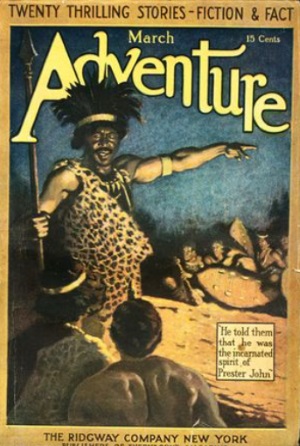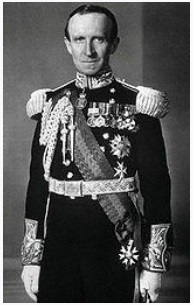 For those of you still not convinced that the old pulp magazines have far more to offer than second rate writing by hacks and literary shysters, allow me to present to you the grossly unheralded John Buchan. A Scottish author whose work mainly appeared in the British Magazine Blackwood’s Magazine, John Buchan’s novel Prester John was serialized in Adventure Magazine in 1910.
For those of you still not convinced that the old pulp magazines have far more to offer than second rate writing by hacks and literary shysters, allow me to present to you the grossly unheralded John Buchan. A Scottish author whose work mainly appeared in the British Magazine Blackwood’s Magazine, John Buchan’s novel Prester John was serialized in Adventure Magazine in 1910.
You probably know him better as His Excellency the Right Honourable the Lord Tweedsmuir, the 15th Governor General of Canada.
A lawyer, politician, and diplomat, he spent most of his time pursuing his true passion – writing adventure fiction. And what a writer he was. Perhaps his best-known work is The Thirty-Nine Steps, a pre-WWI spy-adventure featuring Richard Hannay, a stiff-upper lipped action hero suspiciously like that of Ian Fleming’s creation, albeit one active in the years prior to WWII rather than after them. John Buchan frequently drew on his experiences in various British colonies in the south of African to lend his adventure tales a striking air of verisimilitude.

The Lord Tweedsmuir himself – with duds like these, probably not an author given to cosplay.
After languishing in my reading queue for over a year, I can finally report with confidence that John Buchan’s stories are as fun and exciting as the rest of its pulp contemporaries. The story starts out with three rambunctious young boys on a cold, windswept and rocky Scottish shore, but moves in short order to the vast and trackless expanses of southern Africa. The setting came as a complete surprise to me – knowing the legend of Prestor John as a mythical Christian King the Crusaders believed would one day open up a southern front against the rapacious Saracens, I had expected a tale of knights and castles. Instead, I got a tale of a square jawed adventurer racing about the veldt in an effort to stop an African warlord from uniting the African tribes under his command and then using his might to conquer the world. A pleasant surprise, but not wholly unwelcome.
David Crawfurd’s first meeting with the African warlord, Laputa, occurs in Crawfurd’s hometown when he is just a young boy. Surprising the African who had been posing as a Christian preacher, an early-20th Century Purse Puppy who takes advantage of Anglo kindness to secure the small fortune in donations necessary to begin his conquest of the world. Crawfurd and his friends interrupt the African as he practices a heathen rite on a cold Scottish beach, and we get our first glimpse of Crawfurd’s selflessness as he leads the pursuing Laputa away from his friends, buying them time to escape from the strange African priest though it likely means his own capture. As it happens, Crawfurd escapes the night with nothing more than a beating from his father for tearing his Sunday best and losing his best hat.
Flash forward several years, and Crawfurd finds himself appointed as assistant store clerk in the remote village of Blaauwildebeestefontein where he soon encounters Laputa once again, this time in the company of a devious Portuguese smuggler, Henriques, and a small cabal of native agents. Through some careful sleuthing, Crawfurd and his only friend within a hundred miles, the timid schoolmaster of Blaauwildebeestefontein, learn that Laputa has discovered the location of a fabulous treasure that will convince the local Zulu and Swazi tribes that he is the second coming of the titular Prester John. With their combined might, Laputa has planned a sneak attack on the Colonial forces certain to drive the white devil from the land and restore African rule to the continent once and for all. What follows is a breakneck tale of miraculous escapes, races back and forth across the savannah, two-fisted action, betrayals, fabulous treasures found and lost, strange and ancient rites that marry European and African traditions, cavern complexes full of secret doors and unseen traps, and huge armies on the march.
One aspect of Prestor John certain to surprise modern day readers fed a steady diet of lies about the literature of the early twentieth century is how racist it is NOT. To be sure, the protagonist never once apologizes for his maleness, his whiteness, nor his heterosexuality, nor even questions whether Africa would be better off if it were ruled by the men who had depopulated it through tribal genocide after tribal genocide. Crawfurd takes the improvements to the land’s productivity and the presence of a schoolhouse and military garrison preventing all out war as so obviously beneficial that he never stops to consider whether Laputa should be allowed to carry out his plan to conquer the world under his own boot. All flaws by today’s standard measure, to be sure, but Buchan himself never passes judgement over Laputa.
In fact, Buchan paints Laputa as a magnificent and noble creature. The worst villains of the piece are the traitorous Portuguese agent and the drunken (British) manager of Crawfurd’s store. Buchan never misses a chance to describe Laputa as a man of regal and noble bearing. The first clear description given lays the groundwork:
“For myself I was intensely curious, and not a little impressed. The man’s face was as commanding as his figure, and his voice was the most wonderful thing that ever came out of human mouth. It was full and rich, and gentle, with the tones of a great organ. He had none of the squat and preposterous negro lineaments, but a hawk nose like an Arab, dark flashing eyes, and a cruel and resolute mouth. He was black as my hat, but for the rest he might have sat for a figure of a Crusader.”
But Laputa is not just impressive physically. The man has the bearing of an Emperor, the strategic genius of a Caesar, and the oratory genius of a Williams Jennings Bryant:
“I had heard him on board the liner, and had thought his voice the most wonderful I had ever met with. But now in that great resonant hall the magic of it was doubled. He played upon the souls of his hearers as on a musical instrument. At will he struck the chords of pride, fury, hate, and mad joy. Now they would be hushed in breathless quiet, and now the place would echo with savage assent. I remember noticing that the face of my neighbour, ‘Mwanga, was running with tears.”
Not only that, but Laputa’s aims are not presented as dastardly or untoward – they are simply at odds with those of Crawfurd and his people. Crawfurd and his allies might see little to recommend the typical African tribesman of the time, but they recognize the greatness in Laputa himself. At several points, Crawfurd even laments that he should be the instrument of Laputa’s undoing. The portrayal of this African warlord is at once stirring and poignant, and demonstrates a depth to Buchan’s view of the African natives at odds with the modern portrayal of men like Buchan.
Politics aside, Prestor John serves as yet another example of how much our culture has lost by consigning the pulp stories of the early twentieth century to the dustbin based on lies and half-truths about both the authors who wrote them and the tales themselves. If you’re looking for a solid Indiana Jones style pulp adventure story in a real world setting, John Buchan is an author to add to your own reading queue.
And you can read Prestor John for free, thanks to Project Gutenberg.
Buchan was certainly a good writer. He acknowledged Kipling and Stevenson as early influences, but I find it hard to believe that H. Rider Haggard’s African tales didn’t also influence PRESTER JOHN. Haggard was another popular British author — along with Rohmer and Sabatini — often reprinted in American pulps. HRH’s influence was deep and wide, an undercurrent in modern fantasy stretching from JRRT and Robert E. Howard on up to the 21st century.
-
H Rider Haggard was the first thing I thought of, when reading this. He was of an older generation, with ox-wagons and steamboats.
HRH was also a lot more sympathetic towards African blacks than he’s ever given credit for.-
I remember reading HRH’s ‘Nada the Lily’ with great joy. I wonder how many modern authors would dare to set a story among the pre-European Zulus swith not one single white character whatever?
‘Lily’ is made all the more impressive when I can’t recall one single out and out villain. Even Shaka, shown as a terrible tyrant, has vast bravery and real loyalty to those who help him.
-
GO CANADA!Our 15th Governor-General was a Writer of Adventure Fiction! Why did I not learn of this man in our History Classes? O, yeah…Liberal Government in charge of the Curriculum.
Does anyone on Castalia House know where I can find his Novels or preferably his Short Fiction Anthologies?
-
Jon linked to Gutenberg and there’s this place called “Amazon”…
-
And fadedpage.com for works that have expired their Canadian copyright.
I loved the Hannity series. The 39 steps it’s the first political thriller and the other books are really
fascinating. Greenmantle is kinda scary aboutbthe Germans and Turks during WWI and you can sense the future.
xavier
-
Thanks for the FadedPage tip, Xavier! They do have a good selection of Buchan.
No slight on Jon’s Gutenberg recommendation, but I prefer Roy Glashan’s well set-up and well-stocked book archive. An excellent selection of authors — in a variety of formats — that CH readers should know about. Even I discovered a couple of cool pulp-era authors of whom I really wasn’t aware. Anyway, here’s the Buchan link:
http://freeread.com.au/@rglibrary/JohnBuchan/JohnBuchan.html
For good measure, here’s the Haggard link:
http://freeread.com.au/@rglibrary/HRiderHaggard/HRHaggard.html
We read The 39 Steps while I was in college and Buchan was definitely getting memory-holed back then. Seemed like most of the discussion of the book in class was about how “problematic” Buchan was…
deuce,
You’re welcome. I stumbled on this site when looking for some books that I couldn’t find at Gutenberg Canada.
Another excellent site is Gutenberg Australia
http://gutenberg.net.au/
and I was going to recommend Roy’s site too! 🙂
I mentioned this site before but for those who want to read French literature/pulps (Dumas,Leroux, etc)
check out la bibliotheque electronique du Quebec
https://beq.ebooksgratuits.com/
Another nice English language site:
epubbooks.com. The covers are very plain but calibre can download some nice ones.
xavier
I’ll check this novel out. I just want to say I love what I’ve read of H.R.H. Sadly, his more famous works like “SHE,” and “King Solomon’s mines,” failed to hook me,I may take another shot in the future, I’ve seen the 1950’s movie adaptation of the latter. I’ve read “Nada the lily,” “Montezuma’s Daughter,” and I’m currently on “The Brethren.”
I recall a statement from an African author, calling him “A genius of racism,” it’s probably one of the things that goaded me into reading his works, I found “Nada the lily,” to be a rather complex and well researched tale about the rise and fall of the Zulu empire, I’d say the same for South American tribes depicted in “Montezuma’s Daughter,” in that H.R.H., made clear the parallels between the S.A. Natives, and the Spaniards in matters concerning brutality in the name of a higher power.
-
THE BRETHREN very likely influenced the creation of Robert E. Howard’s Crusader hero, Cormac FitzGeoffrey, who was himself one of the prototypes of Conan the Cimmerian.